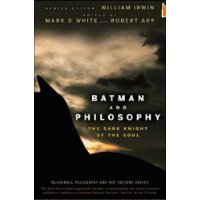
基本信息出版社:John Wiley & Sons
页码:304 页
出版日期:2008年06月
ISBN:0470270306
条形码:9780470270301
装帧:平装
正文语种:英语
丛书名:The Blackwell Philosophy and Pop Culture Series
外文书名:蝙蝠侠和哲学: 灵魂的黑暗骑士
内容简介 在线阅读本书
Why doesn′t Batman just kill the Joker and end everyone′s misery?
Can we hold the Joker morally responsible for his actions?
Is Batman better than Superman?
If everyone followed Batman′s example,
would Gotham be a better place?
What is the Tao of the Bat?
Batman is one of the most complex characters ever to appear in comic books, graphic novels, and on the big screen. What philosophical trials does this superhero confront in order to keep Gotham safe? Combing through seventy years of comic books, television shows, and movies, Batman and Philosophy explores how the Dark Knight grapples with ethical conundrums, moral responsibility, his identity crisis, the moral weight he carries to avenge his murdered parents, and much more. How does this caped crusader measure up against the teachings of Plato, Aristotle, Kant, Kierkegaard, and Lao Tzu?
作者简介 Mark D. White is an associate professor in the Department of Political Science, Economics, and Philosophy at the College of Staten Island/CUNY.
Robert Arp is a postdoctoral research associate through the National Center for Biomedical Ontology at the University at Buffalo, and edited South Park and Philosophy.
William Irwin is a professor of philosophy at King′s College, Pennsylvania, and has coedited The Simpsons and Philosophy and edited Seinfeld and Philosophy, The Matrix and Philosophy, and Metallica and Philosophy.
编辑推荐 From Publishers Weekly
In this, the latest in Wiley's Blackwell Philosophy and Pop Culture series (South Park and Philosophy, The Office and..., Metallica and...), editors White and Arp assert upfront, and without qualification (apparently, that's the contributors' job), their belief that Batman is "the most complex character ever to appear in comic books and graphic novels." Exploring certain works that have broadened the philosophical undercurrents of the Batman mythos (Frank Miller's Batman: Year One and The Dark Knight Returns are cited often, but rarely the new movies), a raft of professors, students and PhD candidates paint Bruce Wayne's choices as, most often, either utilitarian or deontological, with basic descriptions of these systems helpfully provided for the novice. A few contributions broaden the discussion beyond the well-worn (origin stories of Batman and foes, etc.); casting butler Alfred as Kierkegaard's "knight of faith" to Batman's "knight of infinite resignation," contributor Christopher M. Drohan actually gets close to the archetypal sources that keep the serialized exploits of Batman and other comic heroes from getting stale. Unfortunately, most of these essays get old fast.
Copyright © Reed Business Information, a division of Reed Elsevier Inc. All rights reserved.
Review
"...an interesting focus on the battle between "viciousness and virtue"." Empire October 2008
In this, the latest in Wiley’s Blackwell Philosophy and Pop Culture series (South Park and Philosophy, The Office and…, Metallica and…), editors White and Arp assert upfront, and without qualification (apparently, that’s the contributors’ job), their belief that Batman is “the most complex character ever to appear in comic books and graphic novels.” Exploring certain works that have broadened the philosophical undercurrents of the Batman mythos (Frank Miller’s Batman: Year One and The Dark Knight Returns are cited often, but rarely the new movies), a raft of professors, students and PhD candidates paint Bruce Wayne’s choices as, most often, either utilitarian or deontological, with basic descriptions of these systems helpfully provided for the novice. A few contributions broaden the discussion beyond the well-worn (origin stories of Batman and foes, etc.); casting butler Alfred as Kierkegaard’s “knight of faith” to Batman’s “knight of infinite resignation,” contributor Christopher M. Drohan actually gets close to the archetypal sources that keep the serialized exploits of Batman and other comic heroes from getting stale. Unfortunately, most of these essays get old fast. (July) (Publishers Weekly, July 28, 2008)